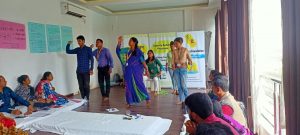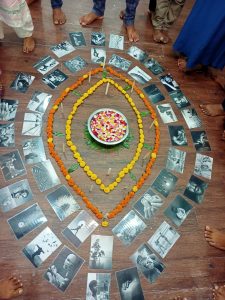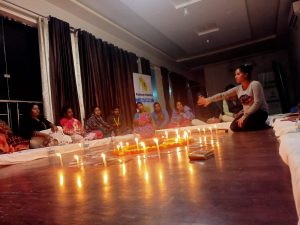

“Rupantaran Foundation” Workshop on Perspective-Building on Gender, Sexuality and Power-Patriarchy

Rupantaran Foundation is a resource agency and one of the partners of Mukti’s ACV (Amplifying Community Voices) project. Rupantaran Foundation trains other organizations who are working on gender issues and creating awareness among the general public. They conducted the first training module for Mukti in June 2022 and the second module was organized from 23rd to 25th November 2022 at Diamond Harbor. Mukti ACV team participated in the 3-day perspective-building workshop, where the participants were trained on gender and sexuality and on the relationship between sexuality and power-patriarchy. Other organizations also participated in the workshop along with Mukti. Five ACV team members – Mr. Apurba Karan, Mr. Pinaki Naiya, Mr. Sibu Das, Ms. Krisha Bodak and Ms. Nandita Jayraman- attended the workshop.

When we talk about gender, our answers are expected to be automatic and confined to two options -male or female. Our feminine or masculine gender, and our straight or gay desires are presumed as natural facts. But at the same time, we are shaped and regulated into this binary thought process by the societal culture at every level: in the clothing we wear, the popular culture we create or consume, the family structures we inhabit, the laws and public policies we obey or defy, and even the words we use.
In the training session, the participants were provided a perspective on how to navigate this paradox whereby sex, gender, and sexuality are taken to be fully natural but also profoundly cultural, and how can we identify and alter the social inequalities built into these ways of thinking and being. In other words, how can we understand sex, gender, desire, and the complex relations among them as malleable products of culture, changing tremendously over time and across different societies?

The patriarchal societal norms encourage men to violate women’s sexuality in both private and public spheres in order to control them. The Brahminical patriarchy not only operates in every sphere of Indian society to control women and their sexuality in perpetuating the caste system and male domination but also considers rape the violation of the purity of a woman’s sexuality and imposes a social stigma on the victim rather than on the perpetrator.
In the training, it was discussed in detail how this social stigma is closing the doors for women to seek counsel and help in the wake of traumatic experiences, how the concept of the centrality of marriage was created, why it affects women more than men, and why different kinds of stereotypes have been created for women.
Project Activities
- A village for independent and enterprising women (A VIEW) (5)
- About Mukti (4)
- Accreditation (14)
- AGM (63)
- Agriculture Reforms (124)
- Ambulance Service (2)
- Amplifying Community Voices (67)
- Awards (15)
- Awareness and Empowerment (137)
- Awareness drives (61)
- Bio-Village-Kankandighi (10)
- Careers (14)
- Chick Rearing Programme for Marginalised Women (16)
- CHILD (23)
- Climate Resilience River Embankment (46)
- Covid-19 (74)
- Cultural Shows (7)
- Cyclone Aila (13)
- Cyclone Amphan (44)
- Cyclone Bulbul (30)
- Cyclone Dana (3)
- Cyclone Remal (12)
- Cyclone Response & Recovery (90)
- Cyclone Tolerant Houses (15)
- Cyclone Yaas (57)
- Disaster Recovery (264)
- Editorial (58)
- Editorial by Abir Biswas (1)
- Editorial by Amit Kumar Dey (3)
- Editorial by Ananya Chatterjee (3)
- Editorial by Ankita Kothiyal (4)
- Editorial by Debabrata Halder (1)
- Editorial by Dr. Alokananda Ghosh Sengupta (2)
- Editorial by Kasturi Bakshi (1)
- Editorial by Monami Mitra (1)
- Editorial by Nandita (3)
- Editorial by Pampa Karmakar (1)
- Editorial by Pranay Patra (1)
- Editorial by Prof. Pradeep Ray (1)
- Editorial by Ranitendranath Tagore (1)
- Editorial by Sankar Halder (14)
- Editorial by Satyajit Ray (7)
- Editorial by Sohini Mehta (1)
- Editorial by Sonamon Basu (3)
- Editorial by Soumitra Bose (2)
- Editorial by Subhankar Basu (1)
- Editorial by Supriya Sarkar (1)
- Editorial by Supriyo Banerjee (3)
- Editorial by Ujjwal Maity (2)
- Education and Enrichment (421)
- Environment and Resilience (127)
- Featured Activities (24)
- Gram Clinic (9)
- Health Water & Sanitation (97)
- HOPE (10)
- Impact Stories List (109)
- Integrated Development (219)
- International Management Institute (IMI) (2)
- Jal hi Kal (6)
- Kitchen Gardening (16)
- Livelihood & Enablement (220)
- MCDF (119)
- Medical Camp (45)
- MIT (8)
- MKSS (50)
- MSS (147)
- Mukti Academia (5)
- Mukti Academy (2)
- Mukti Craft (18)
- Mukti Cultural (2)
- Mukti Employment Exchange (MEE) (9)
- Mukti Fresh (15)
- Mukti Gram - Egra (11)
- Mukti Gram - Purbashridharpur (170)
- Mukti Green Defense in Sundarbans (11)
- Mukti Yoga (12)
- Mukto Dhara (2)
- Northumbria University (2)
- Obituary (6)
- Observance Days Celebration (53)
- Organic Farming & Training Support (45)
- Pond Rejuvenation (20)
- Prerana (1)
- Prerna (4)
- Projects For Mukti Wide (7)
- Queen Mary University of London (1)
- Rights and Special Needs (113)
- Run for Cause (13)
- Run4SafeFood (7)
- SDF (6)
- Shahoshini (9)
- Skill & Enterprise Development (21)
- Smart lab (5)
- Social Stock Exchange (2)
- Social Workers' Convention (1)
- Sundarbans Green (SUN-G) (15)
- Sunderban development fair project (4)
- Surya (13)
- Sustainable Agriculture Movement (63)
- SWAS-2-0 (19)
- Swastha Shongini (33)
- Swavalamban Accelerator in Sundarbans (SWAS) (21)
- Tour for Cause (45)
- TSS (200)
- UDAAN (8)
- Uncategorized (99)
- University of Calcutta (1)
- Value Education (12)
- Valued Partners (3)
- Vocational Trainings (15)
- VOICE (14)